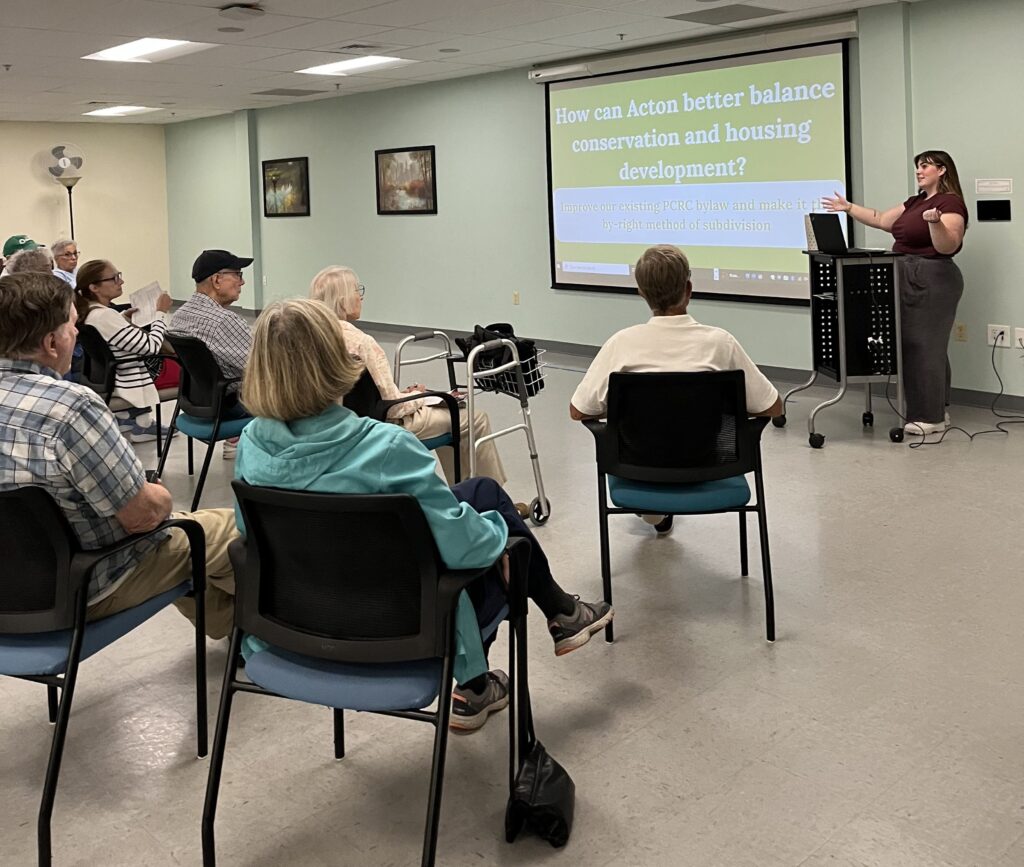The Town of Acton has launched a community engagement effort called Habitat for All, which aims to re-envision how new residential housing development occurs. As part of that initiative, Kaila Sauer, the Senior Planner for the Town, held a workshop and gave a presentation on the project at the Acton Senior Center on Thursday, Sept. 5, 2024.

The community planning project seeks to answer two questions:
– How can Acton better balance conservation and housing development?
– How can we address housing affordability in Acton?
Sauer kicked off the workshop by conducting a live survey. She asked the roomful of Acton seniors a series of questions:
– At any point in your life, have you ever rented or lived in an apartment?
– What type of housing do you live in now?
– Are you happy with your current home or are you looking for something different?
– What is your ideal home?
– What do you value most in a neighborhood?
Then she gave a short presentation about Habitat for All.
Sauer told her audience, “Affordable housing and housing options are scarce, while open space is finite and valuable as well. While the Town of Acton works to create affordable housing, its financial resources are limited and cannot fully resolve the scale of the housing crisis.”
She explained, “Today, Acton’s only by-right method of housing development is the standard subdivision in which a road is created to carve large lots into smaller lots with no open space preserved. This puts a strain on the natural land while creating dispersed housing.”
Sauer concluded, “Habitat for All is a zoning effort to address both housing and land preservation issues comprehensively through a by-right method for housing development that creates deed-restricted affordable housing and protects natural resources.”
So, how can Acton better balance conservation and housing development? Sauer said the Town can do that by improving our current Natural Resource Protection Zoning, which is called the Planned Conservation Residential Community (PCRC) bylaw, and making it the by-right method of subdivision.
The PCRC bylaw has protected over 628 acres of land in Acton since 1991, including Half Moon Hill, Audubon Hill, Bellows Farm, Robbins Mill Estates, and Marshall Crossing. However, it also includes several barriers to implementing Town goals that are included in the Climate Action Plan, Acton 2020 Community Comprehensive Plan, and Housing Production Plan. For example,
– It requires a special permit.
– It requires eight acres to opt in.
– It does not require natural resource identification.
– It does not require affordability.
So, how can we address housing affordability in Acton? Sauer said the Town can do that by
implementing inclusionary zoning, which would either require or incentivize a certain percentage of homes in a new housing development to be deed-restricted and affordable for people with low to moderate incomes.
How can the community implement Inclusionary Zoning? Sauer told Acton seniors these were the key considerations:
– Whether the inclusionary zoning is mandatory or voluntary.
– The set-aside amount (required share of affordable housing; between 10% and 20%).
– How the law applies to rental or sale properties.
– How the law defines eligibility (such as by household income).
– For how many years the home needs to be affordable.
– Whether the law applies to the entire Town or to specific house types or locations.
– Opt-outs (in lieu payments or ability to provide units off-site).
– Incentives (such as density bonuses).
Sauer also tackled the question of how to assure the feasibility of implementing Inclusionary Zoning. She said, “Acton will be conducting an economic feasibility analysis to determine a feasible level of affordability.” Why is this necessary? Because “60% of communities in Massachusetts that have adopted some form of Inclusionary Zoning have not seen any affordable units.”
Sauer concluded the workshop and presentation by letting attendees know there was still time to take an online survey to share their thoughts on new residential development. She added that there would be an Inclusionary Zoning Webinar on Oct. 10 at 7 p.m. and a session at the Acton Memorial Library later this fall.
Acton’s Planning Division plans to present a final proposal to the 2025 Annual Town Meeting next spring.
Greg Jarboe is The Acton Exchange’s beat reporter for the Senior Center and Council on Aging.
